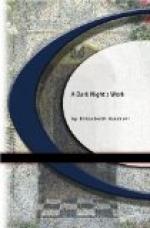“Listen, Mr. Wilkins,” he said, in a low hoarse voice. “You shall never have to say to me twice what you have said to-night. Henceforward we are as strangers to each other. As to Ellinor”—his tones softened a little, and he sighed in spite of himself—“I do not think we should have been happy. I believe our engagement was formed when we were too young to know our own minds, but I would have done my duty and kept to my word; but you, sir, have yourself severed the connection between us by your insolence to-night. I, to be turned out of your house by your servants!—I, a Corbet of Westley, who would not submit to such threats from a peer of the realm, let him be ever so drunk!” He was out of the room, almost out of the house, before he had spoken the last words.
Mr. Wilkins sat still, first fiercely angry, then astonished, and lastly dismayed into sobriety. “Corbet, Corbet! Ralph!” he called in vain; then he got up and went to the door, opened it, looked into the fully-lighted hall; all was so quiet there that he could hear the quiet voices of the women in the drawing-room talking together. He thought for a moment, went to the hat-stand, and missed Ralph’s low-crowned straw hat.
Then he sat down once more in the dining-room, and endeavoured to make out exactly what had passed; but he could not believe that Mr. Corbet had come to any enduring or final resolution to break off his engagement, and he had almost reasoned himself back into his former state of indignation at impertinence and injury, when Ellinor came in, pale, hurried, and anxious.
“Papa! what does this mean?” said she, putting an open note into his hand. He took up his glasses, but his hand shook so that he could hardly read. The note was from the Parsonage, to Ellinor; only three lines sent by Mr. Ness’s servant, who had come to fetch Mr. Corbet’s things. He had written three lines with some consideration for Ellinor, even when he was in his first flush of anger against her father, and it must be confessed of relief at his own freedom, thus brought about by the act of another, and not of his own working out, which partly saved his conscience. The note ran thus:
“DEAR ELLINOR,—Words have passed between your father and me which have obliged me to leave his house, I fear, never to return to it. I will write more fully to-morrow. But do not grieve too much, for I am not, and never have been, good enough for you. God bless you, my dearest Nelly, though I call you so for the last time.—R. C.”
“Papa, what is it?” Ellinor cried, clasping her hands together, as her father sat silent, vacantly gazing into the fire, after finishing the note.
“I don’t know!” said he, looking up at her piteously; “it’s the world, I think. Everything goes wrong with me and mine: it went wrong before THAT night—so it can’t be that, can it, Ellinor?”
“Oh, papa!” said she, kneeling down by him, her face hidden on his breast.




